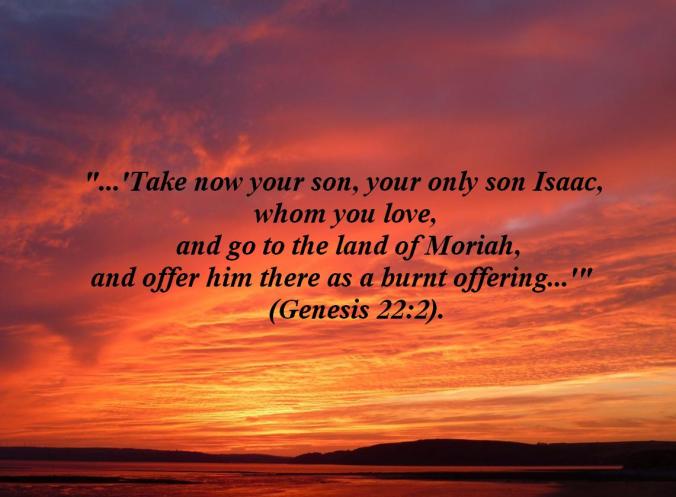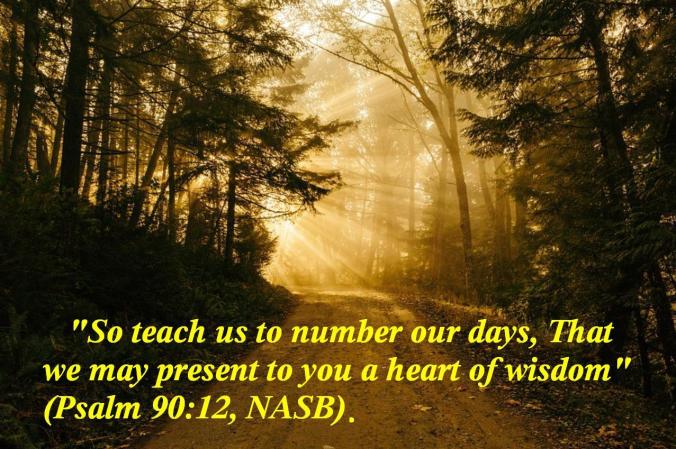“Go therefore and make disciples of all the nations…teaching them to observe all that I commanded you; and lo, I am with you always, even to the end of the age” (Matthew 28:19-20, NASB).
——————–
Contents:
1) Evidences of Faith: The Walls of Jericho (Jim Robson)
2) Exalting Christ (Bill Hall)
3) You’re Satisfied? (Jere E. Frost)
——————–

-1-
Evidences of Faith:
The Walls of Jericho
Jim Robson
On the cover of the December 18, 1995 issue of Time magazine is an artist’s rendition of Moses about to break the tablets of stone on which God had written the Ten Commandments. In bold letters is the question: “Is the Bible Fact or Fiction?” Under this eye-catching headline, we are informed that “Archaeologists in the Holy Land are shedding new light on what did — and didn’t — occur in the greatest stories ever told.” The article which underlies this cover has some interesting information, but also some inconsistencies and misleading statements. I am not in the business of criticizing journalists or their work, so I do not intend to pick out all of the various problems in the piece, nor indeed would there be space to do so in this paper. However, the assertions made regarding the fall of Jericho are particularly interesting, and also perhaps most damaging to anyone seeking the truth. We would do well, therefore, to examine these a little more closely.
On pages 68-69 of the magazine in question is a large black section entitled, “Tales from The Bible That Are in Doubt.” Around this title are arrayed some more artistic renditions of biblical events, each one with a question: “Was Abraham a Myth?,” “Did the Exodus Happen?,” “Was There a Moses?,” and “Did Joshua Conquer the City of Jericho?” In the cases of Abraham, Moses, and the Exodus, the point is that no direct archaeological evidence has yet been found to prove any of these. In typical fashion, “most scholars” agree that these things never happened, simply because there has not been found any direct proof of their existence outside of the Bible! This is nothing new; for generations, scholars have consistently refused to believe anything the Bible says until such time as some extra-biblical evidence forces them to admit that it happened. And even then they insist that the details of the biblical account are full of errors, whether or not they have any evidence to back up their assertions. But the claims Time makes regarding Jericho are somewhat bolder. In this instance, the claim is that the archaeological evidence actually contradicts the scriptural record:
“Historians generally agree that Joshua’s conquest would have taken place in the thirteenth century B.C. But British researcher Kathleen Kenyon, who excavated at Jericho for six years, found no evidence of destruction at that time” (page 68, center column).
This is interesting on at least two levels. First, if there is no archaeological evidence of Joshua’s campaign, and indeed historians don’t even believe it ever occurred, how can they all agree on when it would have happened? Secondly, it is interesting that this article, which repeatedly claims to be talking about new discoveries, cites Kathleen Kenyon’s research. Dame Kenyon excavated in Jericho from 1952 to 1958, and she died in 1978.
Kathleen Kenyon concluded that Jericho’s walls fell around 1550 B.C., some 150 years before the Bible has Joshua coming to the city. According to an article by Dr. Bryant Wood in the March/April 1990 issue of Biblical Archaeology Review, her conclusion was apparently based solely on the lack of pottery from Cyprus in her sites. It seems that certain Cyprian pottery was common in the 1400s B.C., and since she didn’t find any, she decided that the city must have been uninhabited during that time. But John Garstang, who excavated at Jericho from 1930 to 1936, had discovered some of this very pottery! Moreover, some of the local pottery which Dame Kenyon did find is unique to the period 1400-1450 B.C., when she said the city was unoccupied. So, the ceramic evidence actually confirms that the city was occupied until approximately 1400 B.C.
In addition to the ceramic evidence, there is much more archaeological evidence to show that the walls of Jericho fell somewhere around 1400 B.C. For a discussion of this evidence, see Dr. Wood’s article noted above. As to the Bible, I Kings 6:1 states that King Solomon began building the temple in Jerusalem in the four hundred and eightieth year after the children of Israel had come out of the land of Egypt. Construction of the temple began in 966 B.C., so this places the exodus from Egypt at 1446 B.C. When we consider the forty years of wandering in the wilderness, this puts Joshua at Jericho pretty close to 1400 B.C. Furthermore, in spite of the fact that the authors cite Dame Kenyon’s conclusions, the time line on pages 66-67 of the Time article shows the destruction of Jericho at 1400 B.C.! If you ask me, things are looking pretty good for the biblical account so far as the date is concerned, “most historians” notwithstanding.
But Dr. Wood points out that the archaeological evidence indicates more than just the date of the destruction. For example, unusually large stores of grain were found in the ruins. The portions of the city which were excavated were fairly poor, and grain was quite valuable in those days, so there are several conclusions which may be drawn from the fact that the stores of grain were intact: 1. Since grain was stored after harvest, the people ate from the stored grain until the next harvest. Therefore, Jericho must have been destroyed fairly soon after harvest, which would be in the spring. According to scripture, the Israelites crossed over the Jordan during the harvest (Joshua 3:15), then observed the Passover (5:10), and then took Jericho according to the Lord’s command. 2. The city was not taken by means of a long siege, which would have been typical in that time. If it had, the food would have been depleted. Joshua only needed to surround Jericho for seven days (6:3-5, 8-20). 3. Because grain was so valuable to the point of being used as currency, most conquerors would take any grain stored in a vanquished city. The large intact stores of grain in Jericho are therefore an anomaly. But this again is consistent with scripture, which states that the Israelites took only silver, gold, bronze, and iron for the treasury of the Lord (6:24). They took no other plunder.
In addition to the grain, the archaeologists also determined that the walls of the city collapsed. They were not broken by some kind of battering ram, they fell down. Here, of course, is a part of the scriptural account with which many are familiar:
“And it happened when the people heard the sound of the trumpet, and the people shouted with a great shout, that the wall fell down flat” (Joshua 6:20).
Finally, after destroying the city with the sword, the Israelites burned the city and all that was in it with fire (6:24). This again is consistent with the archaeologists’ findings which indicate that after the walls fell down, the city was burned.
So then, we see that in point after point, the archaeology of the city of Jericho agrees perfectly with scripture. And this is not surprising. In fact, the same issue of Time which we have been discussing has an article on page 70 entitled, “The New Testament’s Unsolved Mysteries,” which states:
“Time and again, archaeological finds have validated scriptural references.”
This being the case, why do scholars still insist on doubting the historical accuracy of the scriptural accounts? That may be the real unsolved mystery of the Bible! However, regardless of its detractors, scripture continues to prove itself to be reliable and true. And those of us who put our trust in God’s word continue to find ourselves on solid ground.
— via The Watchman Magazine, March 1, 1998
——————–

-2-
Exalting Christ
Bill Hall
How do we exalt Christ? We exalt Christ when we preach His word, when we follow His teaching, when we do only that which He authorizes, when we wear only His name, when we make Him the center of our affection and adoration, when we recognize Him as our only Head, Lord, and King. To do otherwise is to fail to exalt Him.
— Via bulletin articles of the Collegevue church of Christ, January 10, 2016
——————–

-3-
You’re Satisfied?
Jere E. Frost
So what?
The rich man was satisfied, but God called him a fool and took his life and condemned his soul. (Luke 12:20)
The whole church at Laodicea was satisfied, but Jesus said they did not know that they were actually wretched, and miserable and poor and blind and naked (Revelation 3:16-22).
That’s about how wrong a “satisfied” person can be.
Satisfied? Are you, now? The Pharisee that went into the temple to pray was satisfied with himself, and even glad he was not as the Publican (Luke 18:10-14). But Jesus said that the satisfied Pharisee was not justified like the sin-conscious Publican was!
The wise man warned: “There is a way that seemeth right unto a man, but the end thereof are the ways of death” (Proverbs 14:12).
— Via The Beacon, January 19, 2016
——————–
“Therefore, as you received Christ Jesus the Lord, so walk in him, rooted and built up in him and established in the faith, just as you were taught, abounding in thanksgiving” (Colossian 2:6,7).
——————–
The Steps That Lead to Eternal Salvation
1) Hear the gospel, for that is how faith comes (Rom. 10:17; John 20:30,31).
2) Believe in the deity of Christ (John 8:24; John 3:18).
3) Repent of sins (Luke 13:5; Acts 17:30).
4) Confess faith in Christ (Rom. 10:9,10; Acts 8:36-38).
5) Be baptized in water for the remission of sins (Mark 16:16; Acts 2:38; 22:16; Rom. 6:3,4; Gal. 3:26,27; 1 Pet. 3:21).
6) Continue in the faith; for, if not, salvation can be lost (Heb. 10:36-39; Rev. 2:10; 2 Pet. 2:20-22).
——————–
Tebeau Street
CHURCH OF CHRIST
1402 Tebeau Street, Waycross, GA 31501
Sunday services: 9:00 AM (Bible class); 10 AM & 5 PM (worship)
Wednesday: 7 PM (Bible class)
evangelist/editor: Tom Edwards (912) 281-9917
Tom@ThomasTEdwards.com
http://ThomasTEdwards.com/go (The old Gospel Observer website with bulletins going back to March 4, 1990)
http://ThomasTEdwards.com/audioser.html (audio sermons)





